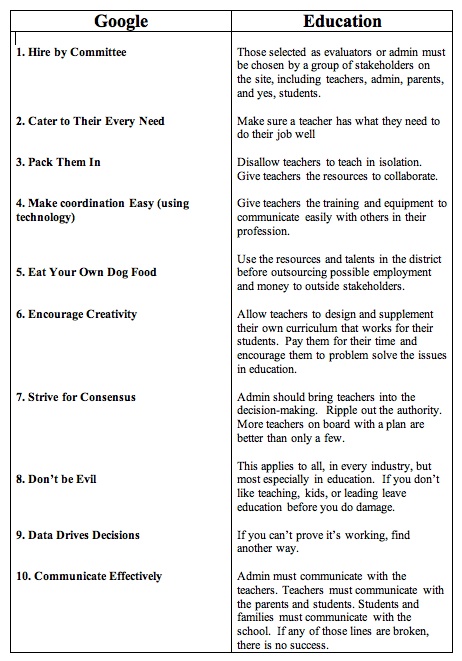Before I came to education, I was in the private sector. And as much as schools would like to think there's nothing to be learned from a business model, the fact is that there are some pluses that education should wake up and listen to. On the flip side, civilians need to acknowledge and realize that the uniqueness of our clientele (the students of this country) and our product (their viability in the future) make education a unique business, incomparable to none, with challenges and rewards unique to any other business model.
Unfortunately, however, the message is lost as policy makers seem insistent on basing their hopes on poor business models, antiquated versions doomed to mediocrity from an industrial era of capitalism and commerce. Statistical test scores determining success, teacher evaluations based on standardized equations - these are not the skills that are predicted as the future of our global community, yet they are being used to define the success of our schools.
However, if they insist that we must compare schools to private industry and students to products, shouldn't we at least base our policies on a relatively successful current model, a model that looks forward rather than being influenced by the past?
How 'bout Google?
I recently stumbled again on the list of Google's Top 10 Golden Rules. I know it's been around for a while, but look at it through the lens of education, and see if it isn't at least metaphorically applicable:

Wouldn't it be interesting to see if we could develop a way to evaluate a teacher's ability to collaborate, a skill that needs to be modeled and taught in the classroom as a future skill for students?
Wouldn't it be innovative to align our assessments, and consequently the data derived from their results, with the skills that a student will need to know, not (as they are now) based on antiquated learning styles from the 1930s, and use this data to help make decisions?
Now, granted, some obstacles that have blocked our use of some of these strategies, I'm sad to say, have even come from those within education. But as long as policy makers continue to compare our schools to businesses and civilians strive to assess those within education based on a business model of evaluation, not recognizing that which makes the comparison inappropriate, than many in education will never be able to trust that which makes some businesses successful.
For you see, there is much to learn from a successful business model that isn't always publicized. It doesn't have to be about goals and competition, but it can be about community and collaboration. Unfortunately, our policymakers have their sites set on the wrong angle of what makes a business a success.
For a successful business might be about making money for the few, but a successful school is about preparing the many for their own potential possibilities.